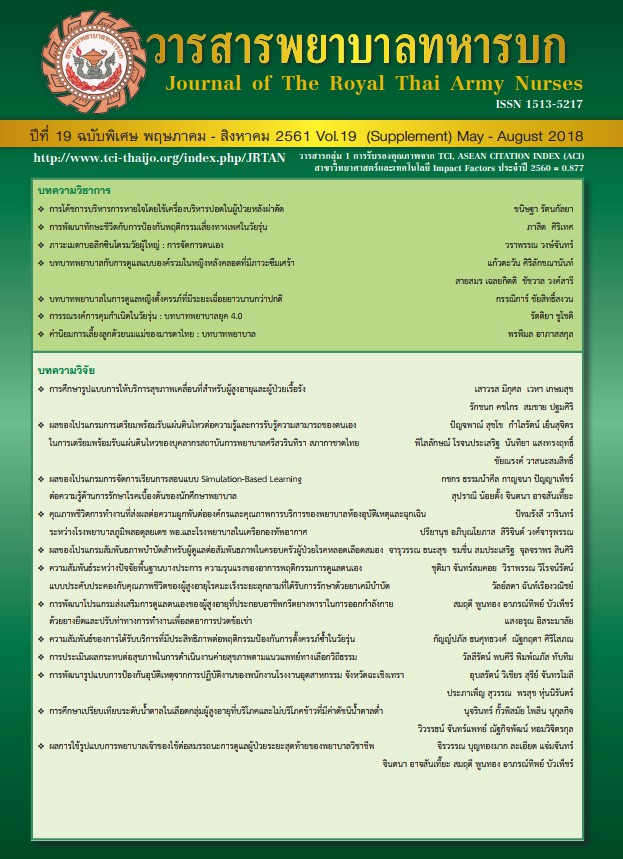Organizational Commitment of Generation Y Professional Nurses at Government Hospitals Located on Islands
Keywords:
Organizational commitment, Professional nurse, Generations Y, Hospital located on islandAbstract
The purposes of this mixed methods research were: 1) to investigate organizational commitment of generations Y professional nurses at government hospitals located on islands, 2) to compare organizational commitment between generations Y professional nurses at community hospitals and at a general hospital located on islands, and 3) to explore guidelines for their organizational commitment development. The samples comprised 2 groups of generation Y professional nurses: 1) 77 nurses who answered questionnaires, and 2) 14 nurses who attended focus group discussion. Research tools included: 1) an organizational commitment questionnaire with reliability 0.96, and 2) a questioning guideline for focus group discussion. The findings were as follows. 1) Generation Y professional nurses rated their total organizational commitment at the moderate level. 2) The organizational commitment between professional nurses at community hospitals and a general hospital were not different. 3) The guidelines for their organizational commitment development consisted of 2 types including 2 dimensions: (1) personal fulfillment e.g. convenient transportation 24 hours, schedule exchange if necessary, and recognition gain from the organization; (2) resources support their work such as sufficient manpower management, right man on the right job arrangement, good colleagues, preceptor provision, and good leaders.
Downloads
References
Smola W.K.,Sutton D.C. Generational differences: revisiting generational work values for the new millennium.Journal of Organizational Behavior. 2002; 23: 363-82
Duchscher B., Cowin L. Multigenerational Nurses in the Workplace. JONA. 2004; 34 (11): 493-501
Calhoun K.S. Generations at Work Journal AAOHN. 2005; 53 (11):469-71
Keepnews M. D., Brewer S. C., Kovner T. C Shin H. J. Generational differences among newly licensed registered nurses. Nursing Outlook. 2010; 58: 155-63.
Chalermpol C. Personality Jane Prospects for future labor. Thairat. 5 January 2016 (in Thai)
Barford I.N.,Hester P.T. Analysis of generation y workforce motivation using mltiattribute utility theory. A Publication of the Defense Acquisition University. 2011;65-80.
Kengkarnchang K. Generation Y and a New Challenge in a Human Resources Administration. Journal of Social Sciences and Liberal Arts 2013; 2:15-27 (in Thai)
Jamieson, I., Kirk R. C., Andrew C., Work-Life Balance: What Generation Y Nurses Want. Nurse Leader 2013;11 (3): 36-9
Tremblay M. L., Marchionni C., Drevniok U., The Needs and Expectations of Generation Y Nurses in the Workplace. Journal for nurse in staff development. 2010; 26 (1): 2-8
Hendricks J. M., and Cope V. C. . Generational: What nurse managers need to know. Journal of Advanced Nursing. 2012; 69 (3): 717-25
Chaubankoh S., Cheevakasemsook A., Oumtanee A. A study of trait components of generation Y Thai profession nurses, Regional hospitals
of 5th Regional health authority.Journal of the Royal Thai Army Nurse. 2017; 18: 155-62. (in Thai)
Khunthar A., Ket Juu.D,Sawaengdee K., Theerawit T. Movement of professional nurses in Thailand. Thai Journal of Nursing Council. 2013; 28 (3): 19-3. (in Thai)
Mowday R.T., Steers R.M. and Porter, L.W. The Measurement of Organizational Commitment. Journal of vocational behavior. 1979; 14 (2): 224-47
Meyer J. P., Allen N.J. A Three – Component Conceptualization of organizational commitment. Human resource management. review. 1991; 1: 61-89.
Bhatti K. K., Qureshi. T M, Impact Of Employee Participation On Job Satisfaction, Employee Commitment And Employee Productivity. International Review of Business Research Papers.2007; 3: 54-68
Wen H. H., Ching C.S., Ying S. L., Rong L. D. Effects of job rotation and role stress among nurses on job satisfaction and organizational commitment. BMC Health Services Research. 2009; 9:8
Wharton R F., Brunetto Y., Shacklock K. The impact of intuition and supervisor–nurse relationships on empowerment and affective commitment by generation. 2011; 68 (6): 1391-40
Lamounpuk S. Multilevel Antecedents and Effects of Professional Engagement on Job Performance and Intention to Leave Nursing Profession of Professional Nurses in Governmental Hospitals, Bangkok Metropolitan Area. Journal of behavioral science. 2015; 21(2): 79-100 (in Thai)
Brunetto Y., Wharton R F., Shackloc K. Communication, training, well-being, and commitment across nurse generations. Nursing Outlook. 2012; 60 (1): 7-15
Dechawatanapaisal D., Numphya K., Nuanluk J., Plermboon C. A Study of Veiewpoint and Expectations of Generational Characteristics between Generational X and Generationa Y. Chulalongkorn Business Review. 2014; 141: 1-7 (in Thai)
Netharn P., Cheevakasemsook A., Oumtanee A. Work Values and Organizational Commitment of Two Generations of Professional Nurses at Private Hospitals in the Bangkok Metropolis. Journal of the Royal Thai Army Nurse 2014;15(2):320-330 (in Thai)
Tassanaanancha P., Prachusilpa G. The Management characteristics of generation Y professional nurses.Kuakarun Journal of Nursing. 2014; 21 (2): 126-38 (in Thai)
Steers R M. Antecedents and Outcomes of Organizational Commitment. Administrative Science Quarterly. 1977; 22 (1): 46-56
Downloads
Published
How to Cite
Issue
Section
License
บทความหรือข้อคิดเห็นใดใดที่ปรากฏในวารสารพยาบาลทหารบกเป็นวรรณกรรมของผู้เขียน ซึ่งบรรณาธิการหรือสมาคมพยาบาลทหารบก ไม่จำเป็นต้องเห็นด้วย
บทความที่ได้รับการตีพิมพ์เป็นลิขสิทธิ์ของวารสารพยาบาลทหารบก
The ideas and opinions expressed in the Journal of The Royal Thai Army Nurses are those of the authors and not necessarily those
of the editor or Royal Thai Army Nurses Association.






